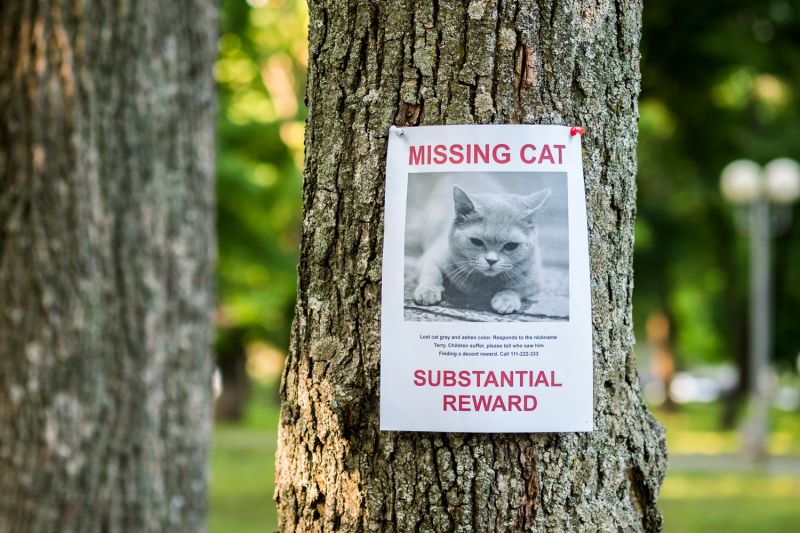Why words matter: ‘Stray’ pets
Whether we consider a found animal ‘stray’ or ‘lost’ has real-world impacts

If you see a dog or cat running outside without an owner in sight, your first thought probably isn’t to question whether the animal is “stray” or “lost.” You likely aren’t thinking about the semantics of language in this moment, but rather what you can do to help the animal.
Yet what may seem like a minute detail can affect what happens to that animal, says HSUS director of shelter outreach and engagement Lindsay Hamrick. In this edited interview, Hamrick explains the “really important distinction” between “stray” and “lost”—and why correct use of these terms matters.
How would you define “stray” and “lost” in relation to animal welfare?
A lost animal is an animal who has a caregiver, whether that’s an individual pet owner or a member of the community providing food and shelter for a community cat. The term “stray” is fairly outdated, and it really comes from decades ago when animal control was focused on bringing in dogs found running loose because of public health concerns, such as the possibility of rabies exposure to the public. Now we know that the vast majority of found animals who are brought into shelters are lost—they belong to somebody.
Why is it important to distinguish between these two terms?
When someone who finds an animal, or an animal shelter, applies the term “stray” indiscriminately, we’re influencing how the general public thinks about animals they may find. When people think of an animal as a stray or abandoned, they’re much less likely to take action that can lead to the reunification of that pet with their owner or caregiver. When they think about an animal as being lost—for example, maybe they escaped a fence and are pretty close to where they live—then they’re more likely to take steps that help to keep that animal in the neighborhood where they were found, as opposed to bringing them into a local animal shelter.
What are some of the ways you see “stray” and “lost” being misused within the animal welfare community?

We still overwhelmingly use the word “stray,” even though the vast majority of animals who come into shelters have caregivers or owners. Statistics show about half of the animals who come into shelters and rescues in this country are lost pets. But the percentage who are reunited with their owners once they enter the sheltering system has always been abysmally low. There are just so many barriers, from geographical and financial barriers to people even knowing to check shelters for their lost pets. It’s one of the least successful metrics for animal shelters and rescues, because it’s really difficult to reunify pets.
So, when we think about why shelters and rescues are overwhelmed, our ability to solve this problem by making sure lost pets are reunified with their owners is the No. 1 thing we could be doing to reduce shelter intakes. And one way we can accomplish that is by being careful in the words we use. We need to counter the knee-jerk assumption that any pet found wandering loose is an abandoned pet or stray.
When would you use the term “stray” instead of “lost”?
If an animal is presumed to truly not have an owner or family, then “stray” helps to clarify that they need help finding a safe place to go. The more we start distinguishing animals who are simply lost from the animals who may truly be on their own, such as an injured cat without any identification, who no one claims after the finder checks with others in the neighborhood, the better our solutions can be.
We need to counter the knee-jerk assumption that any pet found wandering loose is an abandoned pet or stray.
Is there any difference between dogs and cats when using these terms?
I consider them the same because I think of community cats as having caregivers. The research is really clear that outdoor cats tend to be attached to a caregiver or even a group of caregivers.
The more that we start using the word “lost” and apply it across the board, the faster we are going to get to solutions to make sure those animals are getting back home.
What about people who think lost pets must have irresponsible owners?
One in three pets will go missing in their lifetime, so this is not an abnormal thing. I think all of us have lost an animal at some point and have gone searching throughout our neighborhood. And when the public brings lost pets into shelters, the chances of them being reunified with their family drops considerably.
When people find a lost animal, we really want them to think about talking to their neighbors before they do anything else. Obviously, if an animal is in distress, hurt or seems scared and potentially aggressive, that would absolutely be the time to call for help, but most lost pets are in the neighborhood where they live. If we can work with our neighbors to get them back home, we can help not just the animals, but the shelters that are overwhelmed with lost pets.






